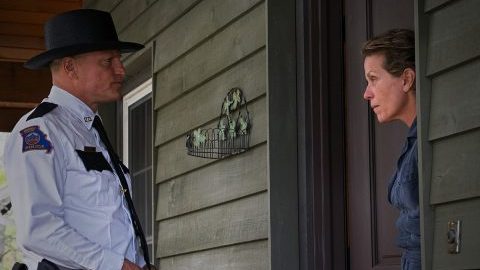Tragedy is all around us. Every week, there is an article in the newspaper about someone who was killed or robbed. Once every few years, it is someone you know. You might not have been friends with this person, but you knew their name. You may tweet about your sympathy or post on Facebook wishing them a speedy recovery. You’ll feel bad for their family and wish them the best, but you would never think it could happen to you or your community.
“Three Billboards Outside Ebbing, Missouri” explores this idea. The film revolves around Mildred (Frances McDormand), a middle-aged woman, who puts up three billboards to remind her town that her daughter’s murder remains unsolved after seven months. The billboards serve as Mildred’s attack on the local police force, especially their sheriff, Bill Willoughby (Woody Harrelson), for not finding the killer. These billboards force the police and people to face the fact that something terrible happened in their small Southern town.
What makes this film shine above the rest is the brilliant screenplay from writer-director Martin McDonagh. Originally a playwright, McDonagh is known for blurring the lines of right and wrong. Nothing is black and white. Everything is gray. As soon as we connect to the grief-stricken Mildred, who is angry at the police, we meet Sheriff Willoughby, who turns out to be a nice guy.
To our surprise, Harrelson plays him as a warm and sincere family man who is truly sorry that he didn’t find Mildred’s daughter’s killer. He explains to Mildred that there are no DNA matches or eyewitnesses, which makes finding a suspect near impossible. But Mildred’s eyes are cold and unsympathetic. She doesn’t care that he’s sorry. She doesn’t care that the billboards are hurting Willoughby’s reputation. She wants justice and will do whatever she needs to do to make the police find her daughter’s killer.
Through McDonagh’s screenplay, we learn that there are no ‘good guys’ and ‘bad guys’ but there are just ‘guys.’ From Mildred’s perspective, Willoughby is bad because he didn’t arrest anyone for her daughter’s murder. But to the community, Willoughby is a good man who cares about the wellbeing of his town and everyone in it. McDonagh tells us that everyone has the potential to be good and everyone has the potential to be bad, especially when tragedy strikes. This is shown flawlessly with Officer Dixon, played to perfection by Sam Rockwell.
Dixon is a racist and a bigot who lives at home with his mother, reading comic books. He is everything you do not want in a cop, yet he is determined to be a good police officer. Rockwell gives an award-worthy performance, as this character goes on a tremendous arc that shows the audience the full spectrum of a human being, not just a ‘good guy’ or a ‘bad guy’.
This is easily Frances McDormand’s best performance since “Fargo.” From the first shot of the film, we know Mildred is on a mission. At all times, she is wearing her navy jumpsuit, like a soldier ready for war. She’s determined to make the police close her daughter’s case. As audience members, we know that she is being unreasonable and harsh, but the viewer sympathizes with her because this harshness is coming from her grief.
She doesn’t have the killer to point out and blame, so she redirects her anger toward Willoughby because he didn’t catch him yet. Her scowl alone will make you want to run to the other side of town. She’s stubborn, determined, violent and strong – strikingly similar to a hitman or an assassin. As the audience becomes accustomed to this side of Mildred, McDonagh then reminds us who she really is. Her face softens and her eyes widen with sorrow as she talks about her daughter. At the end of the day, she’s just a mother who desperately wants closure but is unsure if she’ll ever get it.
If any other director made this film, “Three Billboards” would have just been another murder-mystery/revenge flick. But McDonagh directed his own piece and created a story about grief, loss and family with the rarity of flawed, imperfect yet real characters. In the United States, one third of murders remain unsolved. Mildred’s daughter might fall into that 33.3 percent, which is an awful thing for a parent to hear. But sometimes, cases will never be solved. Some will never know who did it or why. Their loved ones are just gone, and that’s it. But maybe one day, Mildred, along with victims’ families all over the country, can hopefully find some peace.
Lauren LaMagna can be reached at [email protected].




















